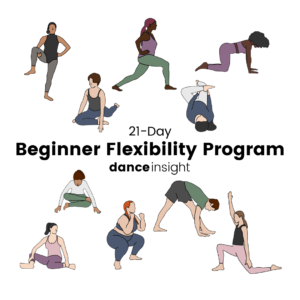When You Don’t Get the Part
It’s an intense time of year for dance students. Studios are casting their winter productions, picking featured parts in competition dances, and moving people up and down levels based on how much they improved (or didn’t improve) over the summer. Maybe you’ve had a great year so far, or maybe it’s been full of disappointment. Well, this week on Dance Insight, we’re talking about what to do when you don’t get the part.
Everyone has a dream role. For me, it was Clara in The Nutcracker. I had learned her dances and memorized her acting scenes. The thought of not playing Clara at some point in my life was unthinkable, because it was my dream, and dreams come true.
You can guess where this story is going. The year came for Clara to be picked from my class, and I was cast in the role of the soldier doll, while one of my best friends got the role of Clara. It was hard to be bitter when my friend played the role so perfectly, but still it hurt a lot. My dream was over.
However hard that year was, at least one good thing came out of it. It gave me experience dealing with disappointment, experience that I can share with you. So if you can relate to my story, read on!
What Not to Do
- If you get one thing out of this post, I hope it’s this. Do not resent the person who got the part you wanted. It doesn’t matter if that person was your friend or someone you barely knew. Harboring bitterness will lead to nothing but bad things down the road. My best friend got my dream role in The Nutcracker, and I was bitter for months. It could have ended our friendship, all for something neither of us could control. I’m so glad I let it go, seeing past my disappointment and realizing that she really was perfect for the role.
- Do not dispute the directors’ choices. Nothing says “sore loser” more than going to the director and saying, “What were you thinking? I should have gotten that part.” If you ever want to be considered for a solo role, leadership position, or anything like that in the future, do not do this. Even if it’s all you can do to hold your tongue, don’t destroy the image of maturity and professionalism that you’ve worked so hard to build for yourself.
- Don’t discuss it excessively. The less you make it “a thing,” the quicker it’ll go away. Sure, your friends knew you wanted that part and you can tell them you’re disappointed. But no one wants to hear you say, “I can’t believe this. I should be doing that solo. No one appreciates me. This sucks,” at every opportunity. It’s annoying. And the girl who got the part will find out you feel this way, which will make everything awkward.
- Don’t compare yourself to the person who got the part. It’s a tempting thing to do. After all, she got the part and you didn’t, so she must be a better dancer, right? Not necessarily. For all you know, the directors couldn’t decide between you and her and they flipped a coin. Or maybe the choreographer for the part you did get was just dying to work with you again. You will never know, and it won’t do you any good to make assumptions.
- Don’t give up. Even if you feel like your hopes and dreams were crushed by not getting this part, this is not the end. If you hope to pursue dance as a professional career, then the crown jewel of your accomplishments will not be a Nutcracker part you played at age 15. I hate to break it to you, but once you get to college, no one cares what you did in high school. (That goes for pretty much any academic field, too.) I will never play my dream role in The Nutcracker, and that still hurts a bit, but I’m a college graduate now, and I can see that it doesn’t really matter in the long run. You probably don’t want to think about that now, but eventually you’ll be able to see the situation from a wider perspective.
What to do Instead
- Congratulate the person who got the part. I know, it’s the last thing you want to do right now. You probably want to break her ankle so they’ll have to cast a replacement. But don’t. One word, “Congrats,” and she’ll know that there are no hard feelings. Okay, yeah, there are hard feelings, but she doesn’t need that weighing on her shoulders. Think about it: if you had gotten the part, would you want the pressure of knowing a bunch of people hated you for it?
- Get down to the root of your feelings. Do some soul searching and think about why you wanted this part so badly. I wanted to play Clara in The Nutcracker because she was the star of the story. The whole production would basically be about me, and I could take the stage in full glory. I would never have said that out loud, but that’s what was in my heart. Chances are, there’s another way for you to achieve the thing you really wanted by getting this role. Be it glory, validation, attention, or acceptance, there is more than one way to fulfill the desires of your heart.
- Play your part to the best of your ability. This was what got me over the disappointment of not being cast as Clara. I gritted my teeth and said, “Fine. You can deprive me of my dream, but I’m going to be the best darn soldier doll in the history of this studio.” Fully committing myself to the role I was put in helped me focus on what was really important: putting on a good show. Eventually, I learned to love my role, and it became one of my favorite parts I’ve ever played.
- It’s okay to be upset. I hope you haven’t gotten to the end of this article thinking that it’s wrong to be upset about not getting a part. It’s perfectly normal, and it shows that you care deeply about your pursuit of dance. Problems occur when either 1) you let those feelings lead you into irrational action, or 2) you suppress the feelings completely and let them eat you up inside. Accept the fact that you’re upset and allow yourself to go through the fall and recovery process.







